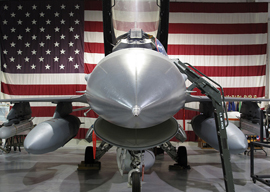
April 18, 2011

When Israel dropped cluster bombs on civilian areas in Lebanon in 1982 and 2006, the US reaction was as swift as it was exemplary: It replaced them. Let us hope it does not follow that precedent with Colonel Gaddafi, although the arms merchants would not object. Money is there to be made with every shot fired, every house leveled, and every peasant blown away. It matters little whether those firing the weapons are Americans in Afghanistan and Iraq or Israelis in Gaza and Lebanon. Rockets, mortar rounds, artillery shells, and bullets must be replaced, whether in Libya, Afghanistan, or Iraq. The battlefield is the great backdrop for advertisers. After the 1982 Falklands War, during which Argentina took out the destroyer HMS Sheffield with French-made Exocet missiles, the British journal Jane’s Defence Weekly accepted ads from Exocet’s makers lauding a product that had been proven in combat”proven, that is, to kill British sailors. Anyone who has attended the air shows at Farnborough, Paris, or Dubai knows that the salesmen whose weapons have turned the tide of battle have a soft sell.
In George Bernard Shaw’s play Major Barbara, a pious character named Charles Lomax tries to rationalize industrialist Andrew Undershaft’s mercenary arms dealing with a justification that a public-relations firm might use for Lockheed or General Dynamics:
Well, the more destructive war becomes, the sooner it will be abolished, eh?
Undershaft, as candid about his profession as Smedley Butler was about his, doesn”t play along:
No, Mr. Lomax, I am obliged to you for making the usual excuse for my trade; but I am not ashamed of it. I am not one of those men who keep their morals and their business in watertight compartments. All the spare money my trade rivals spend on hospitals, cathedrals and other receptacles for conscience money, I devote to experiments and researches in improved methods of destroying life and property. I have always done so; and I always shall.
One imagines that Dick Cheney, his fellow sutlers at Halliburton, and the heavies from General Electric speak this frankly at the country club when there are no preachers or journalists around. So fire away, boys. Every shot leveled at a Libyan soldier, an Afghan fighter, or an Iraqi troublemaker has to be replaced. Every new weapons shipment is another notch upward on the share price. And for all the weapons the US fires, it can sell more to the Israelis, Saudis, and Bahrainis.
There used to be an American arms embargo on the entire Middle East. Starting on December 5, 1947, the US banned all weapons sales to the countries that would be involved in the Arab-Israeli conflict. The embargo remained in force under Presidents Truman and Eisenhower and was not rescinded until Levi Eshkol persuaded Lyndon Johnson to sell Israel some Patton tanks and Skyhawk fighter jets in 1964. Why not give it a try again? No Middle Eastern country uses its weapons wisely or for self-defense. The Arab states deploy them to keep their people down, and Israel uses them to hang onto the West Bank.
If I may mangle Bob Dylan’s lyric from his “Ballad of a Thin Man”: “And you know something’s happening, and you do know what it is, don”t you, Mr. Jones?”